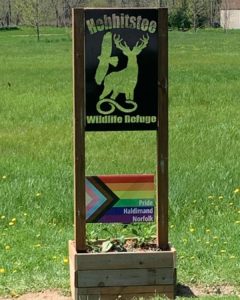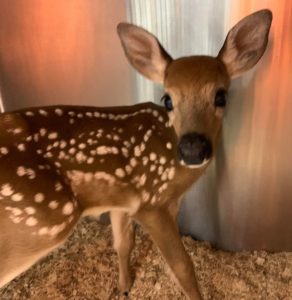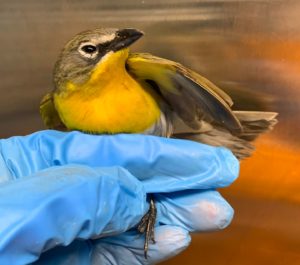A lot has changed at Hobbitstee Wildlife Refuge since they encouraged us to respect the wild nature of wildlife.
One year later, they’re well on their way to expanding.

Hobbitstee’s sign at their new location.
A New Home
“We purchased a new property, and we have since moved. We’re just 10 minutes south of our previous location, but we’re on a much larger property. While we continue to rehabilitate wildlife, we have a very basic temporary wildlife hospital set up while we’re applying for a permit to build a new state-of-the-art wildlife hospital,” explains Founder and Authorized Wildlife Custodian Chantal Theijn.
The temporary hospital is inside a 40-foot converted shipping container with all the equipment and tools needed to rehabilitate wildlife.
Work has begun on the new facility, starting with the outdoor component.
“We’re in the process of building outside enclosures on our new 47-acre property. We’re well on our way there, but there are lots of logistics. Unfortunately, It’s difficult to hire tradespeople right now, and there’s also a shortage of building supplies, so that’s holding us back right now,” Chantal says.

A fawn was brought to Hobbitstee in early May. The team says they don’t normally see fawns this early in the year.
Raising Funds
Even with some delays, they hope the work can still start this year.
“We’re hoping to get started on building in the fall. We believe we have enough money to get the building up, but we need to raise funds to complete the inside,” Chantal says.
To do that, Chantal says they’re putting together an online auction that will happen later this year. Corporate sponsors also have the opportunity to sponsor an entire room in the building.
“We’re also working on a wildlife laboratory, and we have some sponsorship for that, but we’re looking for more donations for it,” says Chantal.
If you’d like to contribute to the new building, you can make a donation online HERE.
New Challenges
Pandemic restrictions put some pressure on Hobbitstee last year, but this year, a new virus is causing its own set of issues.
“We’ve been under a lot of pressure this year due to the highly pathogenic avian influenza. It’s really created quite a nightmare, particularly because the virus has made its way into the fox population,” explains Chantal.
“We’ve been under a lot of pressure this year due to the highly pathogenic avian influenza. It’s really created quite a nightmare situation, particularly because the virus has made its way into the fox population,” explains Chantal.

A fox kit recovering after being found in Lake Erie. Source HERE.
The team at Hobbitstee recently treated a fox kit that was found floundering in Lake Erie. She was quarantined while they monitored her for rabies, canine distemper, and avian influenza.
Chantal says that any fox kits “who might have dined on dead waterfowl would be at risk.”
“The government has also put criteria in place that we have to comply with related to preventing COVID-19 spilling over into the wildlife population. Unfortunately, it’s created a lot of issues and increased expenses, and we’re not provided with any funding to assist with disease surveillance,” she says.

A yellow-breasted chat was brought in recently. These birds are normally not found in Ontario. Chantal says the area they’re in is at the far north side of where they typically live.
With spring in full swing, finding a baby animal is high, and Chantal’s advice from last year remains: if you find a baby animal, leave it alone—its mother is likely close. The presence of viruses in the region is even more reason to leave them alone or call in a professional.
“People should not be touching or handling birds because of the danger of avian influenza. Even with the amount of publicity out there, it’s still good to remind everyone. If you find a sick or injured bird, it’s best to contact your local Animal Control Agency because they know how to handle the bird to prevent spreading the virus. If you find a dead bird or a group of dead birds, you should contact the Canadian Wildlife Health Cooperative, and they’ll send someone out to collect them and test for avian influenza,” Chantal says. To learn more about Hobbitstee, visit their website or follow them on Facebook.